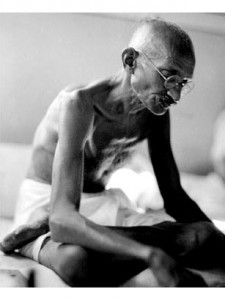February 6
“I have no desire to cause you unnecessary embarrassment, or any at all, so far as I can help.”
–Gandhi, from a letter to the Viceroy, written on the eve of the 1930 civil disobedience campaign (Young India, 3-12-1930)
Gandhi’s faith in the power of Truth was so deep that he never felt that he had to embarrass his opponents to promote his cause. He believed instead that by consistently respecting the full human dignity of his opponent, and taking on the suffering in a situations, if necessary, in an effort to bring the truth to light, his aims would be fulfilled more robustly and directly. A classic — not to say, dramatic example occurred when Britain was caught up in World War Two just as the freedom struggle was gaining momentum. Gandhi held back satyagraha, or executed it only symbolically in the person of one satyagrahi, Vinoba Bhave, to show that they were not going away.
This principle is called “non-embarrassment.” If your opponent is in a position of weakness, or is distracted, it shows a lack of faith in one’s powers to “hit them while they’re down.” Wait until you have their full attention, then show them what you’re made of–that is, catch them off guard with empathy and nonviolence. They probably weren’t expecting it.
Experiment in Nonviolence: Next time you are in some kind of dispute, or perhaps just an argument with someone who’s distracted, resist the impulse to take advantage of the situation. Take the opportunity to stay calm and think clearly, then rejoin when the time is ripe.
Daily Metta 2015, a service of the Metta Center for Nonviolence, is a daily reflection on the strategic and spiritual insights of Mahatma Gandhi in thought, word and deed. As Gandhi called his life an “experiment in truth,” we have included an experiment in nonviolence to accompany each Daily Metta. Check in every day for new inspiration. Each year will be dedicated to another wisdom teacher.









